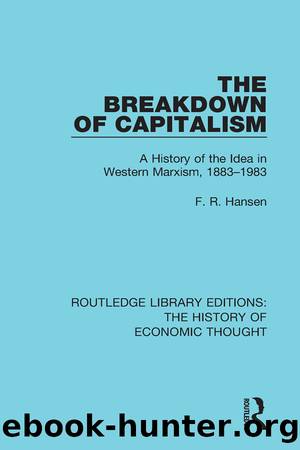The Breakdown of Capitalism by Hansen Fay R

Author:Hansen, Fay R.
Language: eng
Format: epub
ISBN: 9781315387482
Publisher: Taylor & Francis (CAM)
6 The anti-orthodox response to crash and recovery:
Superstructural models of collapse
Liberation from capitalism is liberation from the rule of the economy. When the autonomy of the economy is ended, âpolitical economyâ as an independent science also disappears.
Lukács, History and Class Consciousness
Are we always within the capitalist mode of production? Are we within a later mode? Are we within a mode of production at all, and have we even been in one?
Baudrillard, The Mirror of Production
In 1930, soon after Pollockâs work was published, Horkheimer replaced Grünberg as the director of the Frankfurt Institute, now well established as the center of serious social inquiry in Europe. Horkheimer was a philosopher by training, and a rigorous critic of the German Social Democratic Party and the German Communist Party. His efforts as the new director were supported by Herbert Marcuse and Theodor Adorno, central members of the Institute who shared Horkheimerâs political and theoretical views. The development of Marxist theory in the West over the next forty years was largely the work of intellectuals who, like the central members of the Institute, had little in common with orthodox Marxists or the neo-orthodox theorists who had constructed the dominant forms of breakdown theory in the period before 1930.
The failure of the proletarian revolution in Germany and the rise of fascism in Europe were formative political experiences for the theorists associated with the Frankfurt Institute in Germany and the academies in France. Unlike the generation of Lenin and Luxemburg, which had been marked by internationalism and activism, the anti-orthodox Marxists of Frankfurt and Paris were characterized by parochialism and intellectual isolation, and by their uneasy, sporadic and indirect contact with worker organizations. With what may well have been a glance back to the theoretical failures forced by proximity to particularistic political activity, Horkheimer once wrote, â[o]n the identity of theory and practice, is not to be forgotten their difference.â1
The anti-orthodox theorists were trained as philosophers, with their immediate attention turned away from economics and politics, and towards a discourse on method and aesthetics. Their interest in non-Marxist ideas was intense rather than superficial, and their relationship to Marx was critical rather than committed. Their Marxism was spoken in a code that served the dual purpose of eluding political censorship and avoiding the positivistic terminology of the orthodox and neo-orthodox schools. Their analyses of capitalism appeared in works which were both betrayals and affirmations of Marxâs most fundamental ideas. In the writings of the anti-orthodox theorists, the concepts of Capital were mediated by a series of perceptions and new theoretical elaborations that pressed Marxâs thought to its most extreme, but nonetheless logical, conclusions. As Adorno said, their work did not represent âthe replacement of one theory by another, but the immanent drawing out of certain of the fundamentals of the materialist dialectic.â2
The result of their work was a fundamental shift in the nature of Marxist theory and, consequently, in the formulation of concepts of breakdown, after 1930. This theoretical shift was characterized by a pessimism about the
Download
This site does not store any files on its server. We only index and link to content provided by other sites. Please contact the content providers to delete copyright contents if any and email us, we'll remove relevant links or contents immediately.
| Administration | Adult & Continuing Education |
| Business School Guides | College Guides |
| Financial Aid | Graduate School Guides |
| Law School Guides | Medical School Guides |
| Test Preparation | Vocational |
Spare by Prince Harry The Duke of Sussex(5174)
Navigation and Map Reading by K Andrew(5150)
Tuesdays with Morrie by Mitch Albom(4768)
Machine Learning at Scale with H2O by Gregory Keys | David Whiting(4292)
Cracking the GRE Premium Edition with 6 Practice Tests, 2015 (Graduate School Test Preparation) by Princeton Review(4277)
Never by Ken Follett(3937)
Goodbye Paradise(3798)
What It Really Takes to Get Into Ivy League and Other Highly Selective Colleges by Hughes Chuck(3744)
Fairy Tale by Stephen King(3370)
Harry Potter and the Prisoner of Azkaban (Book 3) by J. K. Rowling(3346)
Pledged by Alexandra Robbins(3170)
Kick Ass in College: Highest Rated "How to Study in College" Book | 77 Ninja Study Skills Tips and Career Strategies | Motivational for College Students: A Guerrilla Guide to College Success by Fox Gunnar(3116)
Reminders of Him: A Novel by Colleen Hoover(3091)
A Dictionary of Sociology by Unknown(3073)
Sapiens and Homo Deus by Yuval Noah Harari(3063)
The Social Psychology of Inequality by Unknown(3017)
Graduate Admissions Essays, Fourth Edition: Write Your Way into the Graduate School of Your Choice (Graduate Admissions Essays: Write Your Way Into the) by Asher Donald(2907)
Will by Will Smith(2907)
Zero to Make by David Lang(2777)
